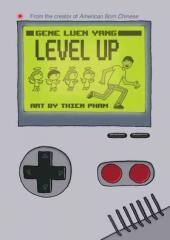 The decade was only roughly ten years gone when the BBC (and then US network VH1) brought nostalgia for the 1980s to TV with I Love the '80s in 2001. America has long been fascinated with looking back on its pop-culture history, but the decade that saw PCs, video games, cable TV, and a variety of musical sub-genres explode maintains a hold on our imaginations. Two of this year's Rosie Award nominees focus on the decade, centered on what has become our true national pastime – gaming.
The decade was only roughly ten years gone when the BBC (and then US network VH1) brought nostalgia for the 1980s to TV with I Love the '80s in 2001. America has long been fascinated with looking back on its pop-culture history, but the decade that saw PCs, video games, cable TV, and a variety of musical sub-genres explode maintains a hold on our imaginations. Two of this year's Rosie Award nominees focus on the decade, centered on what has become our true national pastime – gaming.
Gene Luen Yang's Level Up is set in the present day, and tells the strange story of Dennis Ouyang, whose father always wanted him to be a gastroenterologist. Dennis struggles to be true to his first love, video games, while attending college to fulfill his father's wish. When gaming threatens to overtake his studies, a quartet of cute (but terrifying) angels helps him stay on track, until he reaches a breaking point. Thien Pham's artwork skillfully straddles the indie-comics style while lovingly paying homage to Pac-Man and Nintendo. This book is hilarious, and not just because it deals quite frankly with excretory systems - poop jokes aside, Level Up is a surprisingly serious coming-of-age graphic novel about growing up without letting go of the best parts of childhood.
Ernest Cline's Ready Player One doesn't just touch on video games and the 1980s, it is literally set in a video game obsessed with the decade. In the 2040s, the majority of the world has fallen apart due to dwindling resources, and most people spend all of their time in a totally immersive online game simulation called OASIS. When the game's creator dies, a hunt begins for an "Easter egg" hidden in the game that will bring immeasurable wealth to the first to find it. What follows is a race to find the egg between five main characters and an evil corporation bent on taking over control of the game. All of the challenges involve obscure 80s trivia, from pre-Atari video games to episodes of Family Ties. For those tired of pitch-black dystopia novels, this book reads like a mix between Cory Doctorow's hacker thrillers and a fanboy panel at Comic-Con – smart, geeky, and laugh-out-loud funny. There is a fair amount of explicit language, mainly used for comedic effect.
